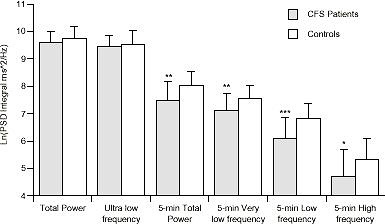Search Research Library:
Research Library
Publication
Assessment of Autonomic Function and Balance in Chronic Fatigue Patients Using 24-hour Heart Rate Variability Analysis
Abstract
Chronic fatigue syndrome (CFS) is a medically unexplained disorder characterized by chronic, disabling fatigue, muscle pain, impaired concentration and a variety of neurobiological symptoms that make everyday activities extremely difficult. While it has been suggested that patients with CFS may have impaired autonomic nervous system function, there have been few studies that have examined this question directly. The purpose of this study was to determine if there were differences in autonomic function, as assessed by 24-hour heart rate variability (HRV) analysis, in 22 CFS patients (age range 31-69, mean age 45.5) as compared to healthy age and sex-matched controls. Holter monitoring was performed on all subjects, and HRV data was subjected to time domain, frequency domain and circadian rhythm analysis. In CFS patients, the SDNN index (mostly sympathetic) and RMS-SD (parasympathetic) measures were significantly lower than in controls. In the frequency domain, 5-minute total power, very low frequency (VLF) (mostly sympathetic), low frequency (LF) and high frequency (HF) (parasympathetic) power were all significantly lower in CFS patients. Circadian rhythm analysis revealed that differences in time and frequency domain measures were significant primarily during the daytime hours; 5- minute total power, LF power and HF power were also significantly lower in CFS patients during the latter part of the sleep cycle. There were no significant differences in mean heart rate or in the LF/HF ratio. Our results indicate that autonomic function is indeed impaired in CFS patients, as both sympathetic and parasympathetic activity are significantly depressed with respect to healthy age and sex-matched controls.

Figure 1.
HRV in Chronic Fatigue Patients vs. Healthy Controls
Frequency domain measures of 24-hour HRV in patients with chronic fatigue as compared with healthy, age- and gender-matched controls. Asterisks denote a significant difference between the two groups. * p < .05, ** p < .01, *** p < .001.

